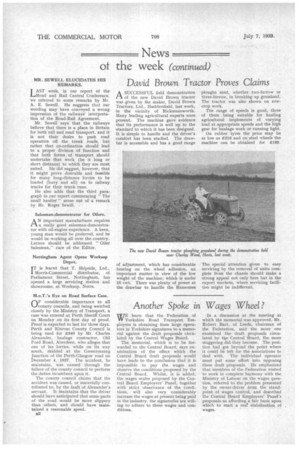of the week ( continued)
Page 36

If you've noticed an error in this article please click here to report it so we can fix it.
MR. SEWELL ELUCIDATES HIS REMARKS.
LAST week, in our report of the Road and Rail Central Conference, we referred to some remarks by Mr. A. E, Sewell. He suggests that our wording may have conveyed a wrong impression of the railways' interpretation of the Road-Rail Agreement.
Mr. Sewell says that the railways believe that there is a place in Britain for both rail and road transport, and it is not their desire to push road operators off the trunk roads, but rather that co-ordination should lead to a proper division of function and that both forms of transport should undertake that work (be it long or short distance) to which they are most suited. He did suggest, however, that it might prove desirable and feasible for many long-distance lorries to be loaded (lorry and an) on to railway trucks for their trunk runs.
He also adds that the third paragraph in our report commencing " The small haulier" arose out of a remark by Mr. Roger Sewill.
Salesman-demonstrator for Oilers.
AN important manufacturer requires a really good salesman-demonstrator with oil-engine experience. A keen, young man would be preferred, and he would be working all over the country. Letters should be addressed " Oiler Salesman," care of the Editor.
Nottingham Agent Opens Worksop Depot.
IT is learnt that T. Shipside, Ltd., i Morris-Commercial distributor, of Parliament Street, Nottingham, has opened a large servicing station and showrooms, at Worksop, Notts.
M.o.T.'s Eye on Road Surface Case.
r\F considerable importance to all %—/county councils, and being watched closely by the Ministry of Transport, a case was entered at Perth Sheriff Court on Monday on its first day of proof. Proof is expected to last for three days. Perth and Kinross County Council is being sued for £340 by Mr. Charles Alexander, haulage contractor, Old Ford Road, Aberdeen, who alleges that one of his lorries, while on its way south, skidded at the Greenloaning Junction of the Perth-Glasgow road on December 4, 1937. The accident, he maintains, was caused through the failure of the county council to perform the duties incumbent upon it.
The county council claims that the accident was caused, or materially contributed to, by the fault of Alexander's servant. It maintains that the driver should have anticipated that some parts of the road would be more slippery than others, and should have maintained a reasonable speed.
B2




















































































